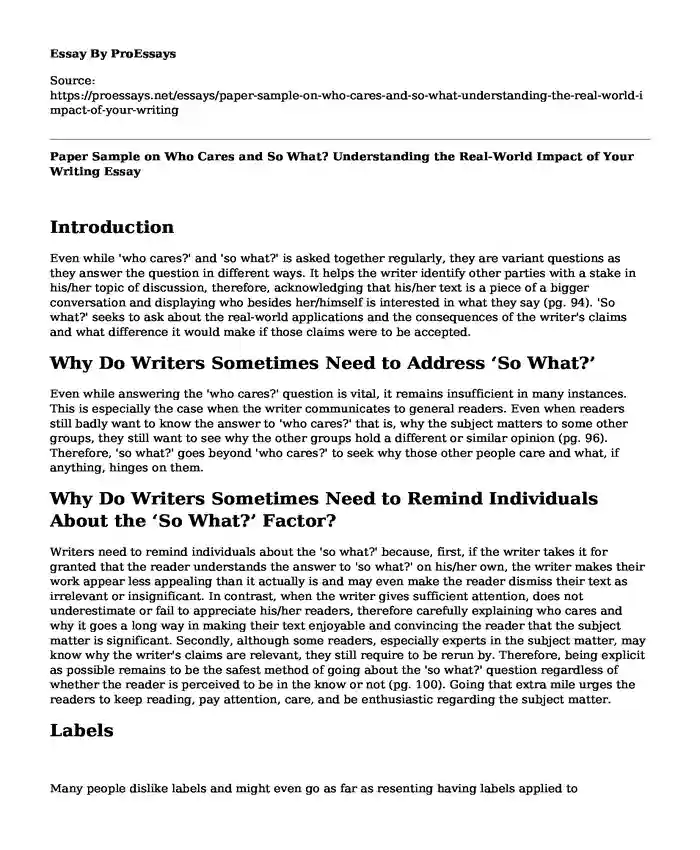Introduction
Even while 'who cares?' and 'so what?' is asked together regularly, they are variant questions as they answer the question in different ways. It helps the writer identify other parties with a stake in his/her topic of discussion, therefore, acknowledging that his/her text is a piece of a bigger conversation and displaying who besides her/himself is interested in what they say (pg. 94). 'So what?' seeks to ask about the real-world applications and the consequences of the writer's claims and what difference it would make if those claims were to be accepted.
Why Do Writers Sometimes Need to Address ‘So What?’
Even while answering the 'who cares?' question is vital, it remains insufficient in many instances. This is especially the case when the writer communicates to general readers. Even when readers still badly want to know the answer to 'who cares?' that is, why the subject matters to some other groups, they still want to see why the other groups hold a different or similar opinion (pg. 96). Therefore, 'so what?' goes beyond 'who cares?' to seek why those other people care and what, if anything, hinges on them.
Why Do Writers Sometimes Need to Remind Individuals About the ‘So What?’ Factor?
Writers need to remind individuals about the 'so what?' because, first, if the writer takes it for granted that the reader understands the answer to 'so what?' on his/her own, the writer makes their work appear less appealing than it actually is and may even make the reader dismiss their text as irrelevant or insignificant. In contrast, when the writer gives sufficient attention, does not underestimate or fail to appreciate his/her readers, therefore carefully explaining who cares and why it goes a long way in making their text enjoyable and convincing the reader that the subject matter is significant. Secondly, although some readers, especially experts in the subject matter, may know why the writer's claims are relevant, they still require to be rerun by. Therefore, being explicit as possible remains to be the safest method of going about the 'so what?' question regardless of whether the reader is perceived to be in the know or not (pg. 100). Going that extra mile urges the readers to keep reading, pay attention, care, and be enthusiastic regarding the subject matter.
Labels
Many people dislike labels and might even go as far as resenting having labels applied to themselves. A good number feels that labels put people in boxes, stereotyping them, and glossing over what makes people unique (pg. 83). Whenever one entertains objections in their writing, they recommend that they stay with them for several sentences or even paragraphs while taking them very seriously all through.
As a writer, mocking a reader's viewpoint alienates those readers who do not already agree with you, who are ideally the target of the text. Moreover, imitating a reader's perspective leads to a hostile argument culture whereby others will be mocking you in return.
Conclusion
All in all, the best way to overcome an objection is by not refuting it completely but agreeing with part of it while also challenging only the part the writer disputes. This answers objections with 'yes, but' or 'yes and no' rather than just 'no.' Complaints should be met with an outsider's eye, that is, the writer putting him/herself in the shoes of someone who objects with them and asks if such a reader would recognize himself in the writer's summary. In case the writer is unable to overcome an objection, then the best thing for him/her to do is to go back and create some fundamental revisions to his/her argument.
Cite this page
Paper Sample on Who Cares and So What? Understanding the Real-World Impact of Your Writing. (2023, Oct 04). Retrieved from https://proessays.net/essays/paper-sample-on-who-cares-and-so-what-understanding-the-real-world-impact-of-your-writing
If you are the original author of this essay and no longer wish to have it published on the ProEssays website, please click below to request its removal:
- Values and Social Location Reflection Essay
- Literature Review on Boot Camps for Teenage Offenders Paper Example
- Essay Sample on Camouflage 1986: Andy Warhol's Immense Artwork
- Merchant of Cool: Fresh Looks Triggering Teen Trends - Essay Sample
- 3 Generations of Mass Media: Past, Present & Future - Essay Sample
- Essay Example on Exploring Cops and Criminal Activities in 21 Bridges & Triple Nine
- Essay Example on Women Expressing Love: How It Has Changed Since the 19th Century







